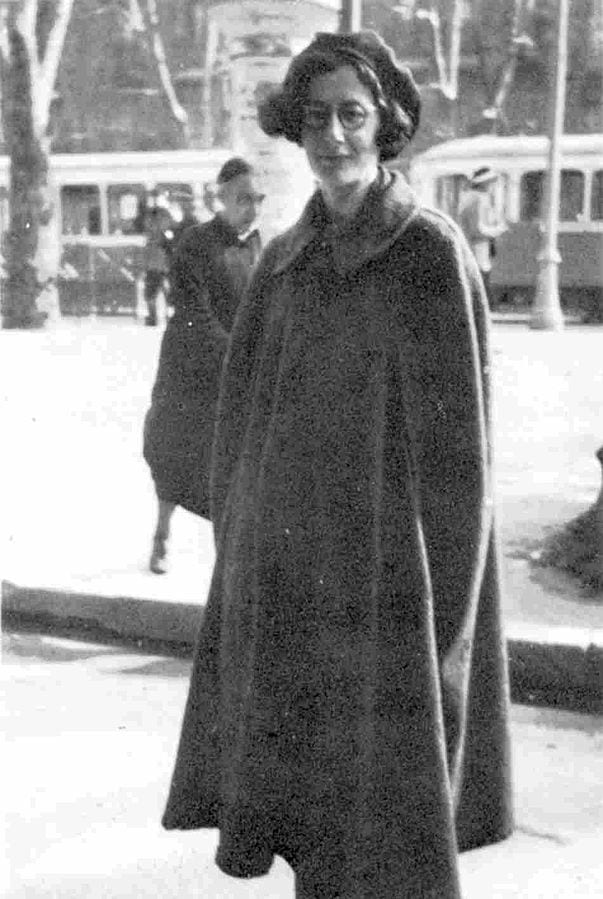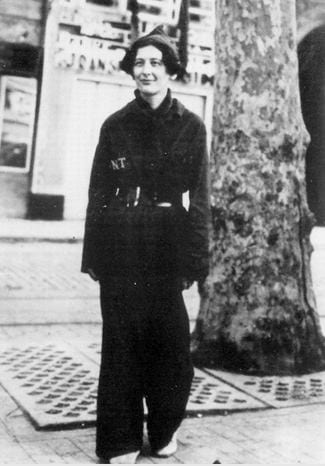by contributing writer Agatha A. Slupek
Simone Weil (1909-1943) occupies a liminal position in the history of ideas. While Weil’s thought is an established concern for scholars of religion and mysticism, she is neglected in the Anglophone study of the history of political thought. Weil’s ambivalent categorization within the history of ideas reflects the trajectory of her life: beginning at the École Normale Supérieure, a common start for French intellectuals, but straying quickly from academics to long bouts of militancy. Her uncommon path and melancholic spirit might suggest that to treat her as simply one among others in the history of ideas would be to do her legacy a disservice. Let us not allow saintliness to prevent us from careful reading.

Simone Weil in Marseilles, circa 1940
In this essay, I argue for the relevance of Weil’s thought to our present political conjuncture: one in which concerns about the ethics of resistance and questions of free speech saturate the public sphere. Weil helps us think through the relationship between individual liberty and collective oppression, as well as how to constitute political groups that don’t reproduce oppressive dynamics. The contradictory space between – not the individual and society, as liberalism would have it – but the individual and the self-constituted collective – was for Weil the site of the political. There is no doing away with this contradiction for Weil. The space of the political remains a contingent and tenuous field that we must always configure anew. Reflecting on Weil in 2017 promises to illuminate key ethical and political problems we face in the context of the rise of neo-fascisms and at the centenary of the Russian Revolution. While at times Weil unjustifiably conflated fascism and communism, her corpus is germane to thinking the contemporary political moment.
Simone Weil and the Organized Left
For those on the left re-visiting the revolutionary legacy of the 1917 Bolshevik revolution on its centenary, a renewed interest in Weil may seem reactionary or irrelevant. Given the changing and storied relationship between French intellectuals and the organized left, committed Marxists can be quick to dismiss her as a member of the so-called ‘anti-totalitarian left’. Weil was never a member of the French Communist Party (PCF), having published perhaps the most scathing critique of the party form. However, she was active on the left, writing pseudonymously in militant journals and gazettes aimed at a workers’ audience. Initially, it was her experience of hard factory labor in 1934-35 that brought her to see the PCF and the CGT as incapable of relieving workers from what she saw as the source of their misery and destitution – a moral degradation caused by the oppressive rhythms of piece-work. Weil’s experiential study of the condition of the French working class led her to assert the primacy of experience in determining both the means and ends of action.
In keeping with what has been called the Machiavellian moment in French philosophy at this time, Weil places emphasis not on the ends of political action, but on the importance of means to attaining desired ends. In contrast to what she saw as the instrumentalist and economistic visions of the PCF and the CGT, the joyous and spontaneous stoppages of work in factories revealed for her the incapacity of either to understand the “eternal demand” of the working class – that one day men be valued more than things (Grèves et Joie Pure [GJP], 74). On this point, Weil praises Marx, noting that the best pages of Capital are in Chapter 10 (E, 73). These pages bring to light the incompatibility of the industrial mode of production with human liberty and satisfaction for the soul (Réflexions sur les causes de la liberté et de l’Oppression sociale [LO], 15-22). For Weil, workers’ experience is what ought to inform political ends and means: she has no doubt that people will organize to combat oppressive and intolerable social conditions. This sense of necessity, she argues, comes from a deep-seated sense of obligation humans have toward one another, founded on the needs of the human body and soul (E, 9-18). But the manner in which they come together is of paramount importance to her philosophy: Weil has a different problem than did other philosophers, more concerned with the anti-totalitarian label, of the 1970s and 80s.

Simone Weil in Spain
For Weil, the 1935-36 wave of steelworkers’ strikes in France was more than the vindication of such and such an economic demand, but above all a pure joy (GJP, 37). The means workers employed to their collective self-constitution – occupying the factories, singing and laughing in the presence of inoperative machinery that heretofore had forced them into submission day after day – were conducive to their ends of liberation from oppression. Weil’s acute sense of the contingency of means carries through to her posthumously published L’Enracinement [E](1949). In this later work, Weil reflects further on the needs of the human soul and how these inform the thorny questions occupying contemporary public debates about resistance and free speech. This may have put her out of step with the French left of her time, but increases her interest in our own.
Free Speech and Resistance, or, Should You Punch a Nazi?
Weil’s libertarian influence, wariness of collectivities, and “bias against the first person plural” has lead earlier commentators to view her thought as profoundly anti-political (e.g., O’Brien 1977). Weil derives all human obligations from the basic needs of the soul, yet to freedom of speech she devotes more discussion than to any other of the fourteen she enumerates, suggesting a profound concern with the collective aspects of human existence (E, 35-48) Weil writes that intelligence is vanquished when thoughts are preceded, implicitly or explicitly, with that little word nous (E, 41). Important, however, is that in French there is a distinction between nous (first person plural) and on (impersonal plural). While Weil is of the view that thought is hampered if preceded by the ‘we’, as we have seen, she is by no means allergic to the impersonal plural in the sphere of collective action. The political lies exactly in this tension, between the self-asserted nous and the individual human soul, that is always already in contact with the impersonal on. Means are never neutral, however: to use the ‘we’ in this sphere also entails that one’s freedom of speech is not unlimited. Weil in fact denies that collectivities such as journals or political parties have an unreserved freedom of speech, suggesting instead that collectives considered as such do not have rights (E, 10). In Weil as in Hannah Arendt, anti-totalitarian thought reveals to us the complex and tenuous relationship between ethics and politics.
Anti-totalitarian thought has been cast as reactionary, namely, as prompting a retreat into moralism and away from politics conceived of action within relations of force. The work and life of Simone Weil, who remained a committed militant throughout her life, defies such easy denunciation. Though fascinated with Christianity (though not herself a Christian in any formal sense), Weil is by no means a uniformly pacifist thinker. Her militancy in pacifist and anti-fascist organizations in the early 1930s and polemical remarks on the effects of war on the human soul do not describe her full trajectory. In 1943, Weil describes her affiliation with pacifist groups as a mistake (Oeuvres, 77), and her later writings are very ambivalent not as to whether there be a responsibility to resist collective oppression, but how to go about doing so without reproducing oppressive logics. It is this how that guides her life and words, and I suggest, prompts us to consider her legacy beyond the simplistic lens of a beautiful soul. Looking to Weil’s thought today to understand the relationships of political means to ends constitutes a fruitful terrain for scholarly research and public reflection alike.
In France, Valérie Gérard (ENS) has begun to do so, taking interest in Weil’s influence by the Machiavellian currents in inter-war French intellectual circles. Taking this approach to her texts reveals Weil’s critique of abstract universals and emphasis on the concrete in new light. Gérard points to Weil’s favorable remarks on class struggle and her comments on the relationality of political action (L’Iliade ou le poème de la force, Appendice, 159). In the Anglophone world, Antonio Y. Vásquez Arroyo has presented a compelling reading of Weil as advancing a political ethic, that is, “a public ethic that deals with questions of collective life” (104). Her critique of abstractions and collectives lends itself on first glance to a moralistic and ‘merely anti-totalitarian’ reading. However, contemporary evaluations of militant action share her preference for means of resistance – spontaneous, joyful, and conjunctural – that do not reproduce oppressive dynamics, and we have much to learn from her writings on this subject.
So, would she punch a Nazi? That may be the right question to ask our protest buddies, but is a less fruitful approach to Weil. We look to the history of ideas not to find prescriptive rules for action, but to mine it for a richness of insight and feeling that can illuminate our contemporary struggles. We would do well to look to Weil today, not to validate our political agendas, but to find in her work a powerful and nuanced reflection on the nature of oppression, free speech, political association, and resistance.
Agatha A Slupek is a doctoral student in political theory at the University of Chicago. Her research interests are in feminist theory, 20th century continental thought, and democratic theory.



1 Pingback